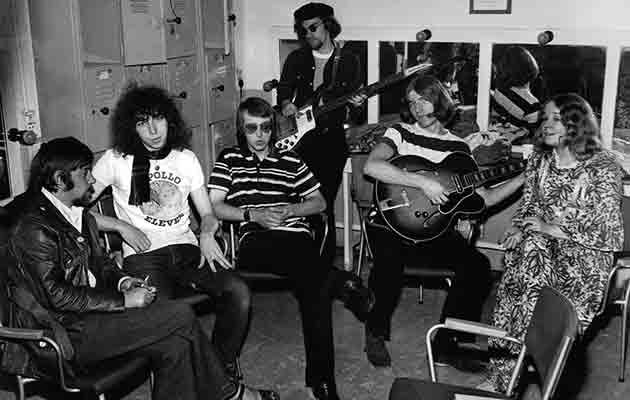They were a bunch of uptight Londoners who wanted to be The Byrds. But after a tragic road crash, Fairport Convention holed up in the countryside, tapped into mystical traditions and reinvented English folk-rock. Nearly 40 years later, they remember: “We were on a crusade...” Originally publish...
Fairport re-emerged from their retreat on 24 September 1969, with a grand comeback concert at London’s Royal Festival Hall through one of the biggest PA systems the venue had ever hosted. Also on the bill were Nick Drake and John & Beverley Martyn, whose acoustic songwriting, though now referred to as ‘folk rock’, stood in marked contrast to Fairport’s melting pot of old and new.
Following their rapturously received, deafening show, the group went into South London’s Sound Techniques studio in October with producer Joe Boyd and engineer John Wood to record Liege And Lief’s eight tracks. It begins with “Come All Ye”, a swinging ‘calling-on’ song, which gives a pocket description of each band member, but also can be read as a wider invocation, a summoning of England’s dormant musical powers: “Together we shall try/To raise the spirit of the air/And move the rolling sky”.
“Come All Ye” is one of three new songs that sit amongst the traditional songs and jigs. Two Thompson compositions point to the recent tragedy that none of them were discussing openly over the breakfast table. “Farewell, Farewell” is addressed to the nameless dead who will “never return to see your bruised and beaten sons”; the phrase “and will you never cut the cloth” possibly alludes to Jeannie Franklyn’s career as a fashion designer popular with the likes of Jimi Hendrix. “Crazy Man Michael”, credited to Swarbrick and Thompson, closes the record with a bitter tale, sung with pitiless understatement by Sandy Denny, of a man deranged by visions ever since he shot a raven, only to discover his own lover with a bullethole through the heart. It is a bitter, devastating end to the record, but its formal language and pastoral-mythological setting help it slot right in with the genuinely old songs.
Liege And Lief was a high watermark for Fairport Convention, and for British folk rock. But because the album was imitated and diluted so many times, it also marked the beginning of the genre’s long decline, as legions of lumpen labourers ploughed through jigs and reels at breakneck pace.
The Fairports line-up didn’t even survive until the album was released. Both Sandy Denny and Ashley Hutchings left the group in November. As Dave Mattacks observes, they were at opposite extremes. “Ashley’s left of centre – ‘English folk music is the holy grail’, and he wants to go completely in that direction. Sandy’s already done the traditional thing and is pursuing her own writing. And there’s this group of people in the middle who like the marriage of the two extremes. One minute we’re doing all these great gigs and everything seems to be going really well, and then the next minute they’re both gone.”



